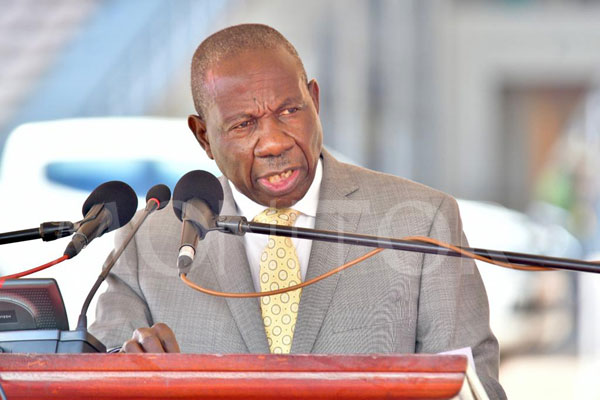Prime
Government misses revenue collection target by Shs120b

Finance minister Matia Kasaija. PHOTO/ FILE
What you need to know:
- Ministry of Finance officials said in the performance of the economy monthly report for last month, which was released on December 18 that domestic revenue collections amounted to Shs2.131t.
The government missed its domestic revenue collection target by Shs120b in November following shortfalls under taxes in international trade transactions and indirect domestic taxes.
Ministry of Finance officials said in the performance of the economy monthly report for last month, which was released on December 18 that domestic revenue collections amounted to Shs2.131t.
“This was lower than the Shs2.251t target for the month mainly on account of shortfalls in tax revenue which more than offset the surplus in non-tax revenue,” the Ministry of Finance, Planning and Economic Development said in the performance of the economy monthly report for November.
The Macroeconomic Policy Department in the Finance ministry, which prepares the monthly performance of the economy, said tax revenue collections were Shs1.938 trillion, against a target of Shs2.065t, resulting in a shortfall of Shs127.45b.
“Most of this shortfall was recorded under taxes on international trade transactions, while indirect domestic taxes also contributed to a smaller extent,” the Ministry of Finance said.
Computed statistics by the Ministry of Finance indicates that a total of Shs797.92b was collected from international trade transactions. This was against a target of Shs910.59b, implying a shortfall of Shs112.67b.
The Ministry of Finance said this was mainly attributed to lower than projected imports on which VAT and excise duty are levied.
Indirect domestic tax collections totalled Shs476.45b against a target of Shs531.09b as both Value Added Tax (VAT) and excise duty were below their respective targets for the month by Shs30.29b and Shs24.35b.
“On the other hand, direct domestic taxes continued to perform well, registering a surplus of Shs41.91b (6.7 percent above target of Shs621.62b) in November 2023. Particularly, withholding tax on treasury instruments and rental income registered a surplus against their target,” the performance of the economy monthly report for November reads in part.
In terms of government spending, the computed figures reveal that the government spent a total of Shs3.378t in November 2023. This was against a programmed expenditure of Shs3.197t.
The Ministry of Finance said the higher than programmed spending (by 5.7 percent) was registered under both recurrent and capital expenditure categories. Expenditure on the recurrent items of the budget was 6.1 percent higher than initially planned for the month. This followed a supplementary budget that was approved in quarter two for both wage and nonwage recurrent expenditure, implying an upward revision in the initial plans.
Development spending was also higher than planned by 14.8 percent owing to a substantial increment in funds released in quarter two to compensate for the low release in quarter one for this category.
The Ministry of Finance said a big percentage of expenditure under this category was towards Emyooga as the government continues its effort to support the private sector and vulnerable households.
The Finance ministry revealed that economic activity as well as prospects about business conditions continued to strengthen as shown by the high-frequency indicators of economic activity.
The Composite Index of Economic Activity (CIEA) increased by 0.65 percent from 161.52 in September 2023 to 162.57 in October 2023. This increase signalled a sustained improvement in economic activity across the economy.
Stanbic Bank said in its monthly Purchasing Managers’ Index on December 2023 that the Purchasing Managers’ Index (PMI) in Uganda increased from 52.4 in October 2023 to 53.4 in November 2023 and has remained above the 50.0 threshold mark for the 13th month running to signal a sustained improvement in business conditions in the Ugandan private sector.
This increase in the PMI is partly attributed to the rise in customer numbers, which helped to drive the expansion in new orders. With both output and new orders rising for the 16th consecutive month because of solid consumer demand, hiring increased for the eight-month running, with firms hiring more staff on temporary basis to handle increased orders and purchasing activity as well as to address backlogs.
With the increase in demand and companies increasing output accordingly, activity rose across four (construction, industry, services, agriculture) of the five monitored sectors, the exception being wholesale and retail.
Sentiments about doing business in Uganda continued to be positive though with a lower level of optimism during the month as shown by the Business Tendency Index (BTI) which reduced from 59.59 in October 2023 to 58.48 in November 2023. The reduction in optimism is partly explained by the negative perceptions of doing business in the wholesale trade sector.
Investors were also less optimistic in the construction, manufacturing and services sectors but more optimistic about the agricultural sector.
In his keynote address presented at the 7th Annual MoFPED-NTV Economic Summit held at Kampala Serena Conference Centre on December 5, Permanent Secretary and Secretary to the Treasury Ramathan Ggoobi said Uganda is still faced with the problem of low tax revenues.
“We are collecting only 14 percent of GDP. The average for our peers is 18 percent,” he said.




